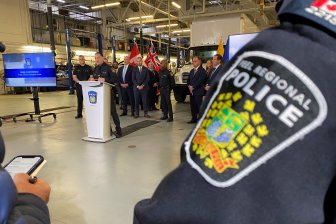BANGKOK – Gunfire rang out across a busy intersection in Thailand’s capital for more than an hour Saturday as government supporters clashed with protesters trying to derail tense nationwide elections one day before the vote begins. At least seven people were wounded, including an American photojournalist.

People caught up in the mayhem crouched behind cars and ducked on a pedestrian bridge while others fled inside a nearby shopping mall. Several masked gunmen wearing armoured vests bent down under a highway overpass as one of them fired a weapon concealed in a green sack.
The exchange of fire was the latest flare-up in a monthslong struggle by protesters to overthrow Prime Minister Yingluck Shinawatra’s beleaguered government, which they accuse of corruption. The turmoil raises the prospect of more violence Sunday, when polls open for an electoral contest that has devolved into a battle of wills between the government and protesters — and those caught in between who insist on their right to vote.
WATCH: Gun fire rings out as violence grips Bangkok on eve of general election
Saturday’s confrontation began after a group of pro-government supporters marched to a district office in the northern Bangkok suburb of Laksi. The office had been surrounded by protesters intent on preventing ballot boxes housed inside from being delivered to a nearby polling station Sunday.
Tensions mounted for hours before clashes finally broke out. As gunfire rattled the area and people screamed in fear, an enraged mob of pro-government supporters wielding huge sticks smashed the windshields of a car carrying protesters that sped away.
Associated Press journalists saw a gunman allied with protesters firing an assault rifle, and another firing a pistol as he lay on his stomach on the road. Sunai Phasuk, a senior researcher for Human Rights Watch, said several pro-government gunmen climbed to the mall’s rooftop and began firing down toward rivals. The two sides also fought with rocks and firecrackers.
READ MORE: Thai government says no delay in Sunday election
“What is clear is that both sides had weapons, both sides were armed,” Sunai said. “This is a very worrying sign.”
According to the city’s emergency services, at least six Thais were wounded, including a reporter for the local Daily News newspaper. An American photojournalist, James Nachtwey, was grazed by a bullet in the leg.
The conflict pits demonstrators who say they want to suspend the country’s fragile democracy to institute anti-corruption reforms against Yingluck’s supporters and civilians who know the election will do little to solve the nation’s crisis but insist the right to vote should not be taken away.
The protesters, a minority that cannot win power at the polls, are demanding the government be replaced by an unelected council that would rewrite political and electoral laws to combat deep-seated problems of corruption and money politics. Yingluck has refused to step down, arguing she is open to reform and such a council would be unconstitutional.
Since protests began late last year, at least 10 people have been killed and nearly 600 wounded.
“How did we get to this point?” asked Chanida Pakdeebanchasak, a 28-year-old Bangkok resident who was determined to cast her ballot Sunday no matter what happens. “Since when does going to vote mean you don’t love the country?”
WATCH: Protests continue in Thailand despite emergency decree
Although unrest already hit Bangkok and polling stations may not open in some parts of the south if ballot materials don’t arrive in time, voting is expected to proceed smoothly in most of the country.
Police said they will deploy 100,000 officers nationwide, while the army is putting 5,000 soldiers in Bangkok to boost security. More than 47 million people are registered to vote.
Whatever happens, the outcome will almost certainly be inconclusive. Because protesters have already blocked candidate registration in some districts, Parliament will not have enough members to convene. That means Yingluck will be unable to form a government or even pass a budget, and Thailand will be stuck in political limbo for months as byelections are run in constituencies that were unable to vote.
A power vacuum may entice the military to step in and declare a coup as it did in 2006, when Yingluck’s elder brother, ex-premier Thaksin Shinawatra, was deposed. Thaksin lives in exile but has remained a central — and highly polarizing — figure in Thailand’s political strife ever since. The rural majority in the north adore him for his populist policies, such as virtually free health care, while Bangkok’s elite and many in the south consider him and his family a corrupting influence on the country. Protesters say Yingluck is a puppet of her billionaire brother.
READ MORE: Thai protesters march as state of emergency begins
Another possibility is what is being called a “judicial coup.” Analysts say the courts and the country’s independent oversight agencies all tilt heavily against the Shinawatras’ political machine, and Yingluck’s opponents are already studying legal justifications to nullify Sunday’s vote.
“I think probably we are moving toward a judicial coup of some sort,” said Chris Baker, a Bangkok-based political analyst and writer. “I think we are moving toward a position in which some part of the judicial machinery, be it the Anti-Corruption Commission, the constitutional Court, some combination of this, will somehow bring down this government.”
The protests began in earnest late last year after the ruling party tried to push through an amnesty bill that would have allowed Thaksin to return from exile.
Desperate to defuse the crisis, Yingluck dissolved the lower house of Parliament in December and called new elections. But protests only intensified, and Yingluck — now a caretaker prime minister with limited powers — has found herself increasingly cornered. Thai courts have begun fast-tracking cases that could see Yingluck or her party banished from power, and the army has pointedly left open the possibility of intervening again if the crisis is not resolved peacefully.


Comments